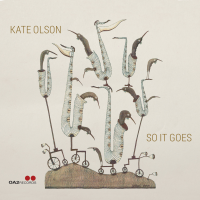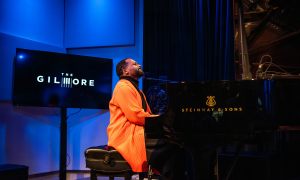Apple chief Steve Jobs welcomes opening up of market, but consumers face higher charges
Music group EMI yesterday scrapped copy protection on all its digital tracks in a move that was immediately hailed by Apple chief executive Steve Jobs as “the next big step forward in the digital music revolution".
For the first time, downloads by artists including Robbie Williams, Coldplay and Joss Stone purchased from any online music store will be playable on any digital music player, including the market-leading iPod, with no restrictions on their use.
Music group EMI yesterday scrapped copy protection on all its digital tracks in a move that was immediately hailed by Apple chief executive Steve Jobs as “the next big step forward in the digital music revolution".
For the first time, downloads by artists including Robbie Williams, Coldplay and Joss Stone purchased from any online music store will be playable on any digital music player, including the market-leading iPod, with no restrictions on their use.
Article continues Until now, owners of digital music players have been restricted to buying downloads from certain stores, depending on the make of their device and the sort of copy protection it could handle.
Now owners of devices other than the iPod can buy songs from the iTunes music store, and the tracks will be available with higher quality sound. Conversely, iPod owners will be able to choose from a wider range of stores.
The announcement by Apple and EMI was tempered by news that the companies may face an investigation into anti-competitive behaviour. The European commission has sent formal charges to major record companies and Apple, alleging that they are restricting music sales in Europe, a commission spokesman said last night.
The spokesman said agreements between Apple and the record companies face an antitrust inquiry which will investigate allegations that consumers in different European countries are charged varying prices and barred from downloading tracks from foreign websites. The inquiry was triggered by a complaint from Which? that the UK version of iTunes was more expensive than other European countries'.
Yesterday Mr Jobs, who this year published a letter calling on the music industry to open up its operations, said he expected half of all the 5 million tracks available through the iTunes store to be free of copy protection, or digital rights management (DRM), by the end of the year.
EMI chairman Eric Nicoli, under pressure following two recent profit warnings and feverish takeover speculation, was keen to deliver an upbeat message: “These new products will allow fans to buy tracks from any retailer that stocks them and, crucially, listen to those tracks on the device of their choice."
But the move could backfire on the company, with some immediately suggesting it was a clever way of record labels and digital stores raising prices.
The breakthrough was seen as an admission that the troubled music industry had misjudged its approach to piracy in recent years by attempting to control how consumers could transfer songs they had bought between different music players.
Their insistence on persisting with technology that prevented tracks being played on a range of devices had, some believe, stymied growth.
The announcement by Mr Nicoli was also seen as part of a wider move by the record industry to show it is embracing the digital future amid fears that the younger generation is falling out of the habit of buying music altogether.
This week Sony BMG said it would no longer accept demo tapes or CDs from prospective new signings, encouraging artists to sign up to a MySpace-style blogging network instead.
Yesterday's move is expected to invigorate the market for music downloads, which currently account for about a 10th of all music sales. While download sales are increasing at a rapid rate, they are not doing so fast enough to compensate for declining CD sales.
EMI's decision to remove digital rights management software from its entire back catalogue and new releases is expected to signal similar moves by other major labels.
But consumers will have to pay extra for the new “premium" features. The DRM protected tracks will continue to be available for 79p each, but in order to buy the new unprotected versions playable on any device and with higher sound quality they will have to pay 20p per track more. In an effort to boost sales, the price of complete albums sold in the new format will remain at 7.99.
Existing customers of the iTunes Music Store who want to upgrade tracks they have already purchased online will be able to do so for 20p a track. Mr Jobs denied the move was a price increase by another name.
“We're not increasing the price. We're adding another product that is priced higher and offers more features. The features that it offers are higher sound quality and hassle-free interoperability. If you think those things are worth it, you can pay the extra 20p. If you don't think it's worth it, you don't have to," said Mr Jobs. Apple's iTunes Music Store is by far the most popular online music store having sold more than 2.5bn tracks globally.
EMI experimented with offering the new files late last year, using Lily Allen, Relient K and Norah Jones tracks. Mr Nicoli said the research showed consumers “overwhelmingly" prefer to pay more for better quality tracks and that in trials the more expensive option outsold the cheaper version by 10 to one.
Analysts hailed the move as another PR masterstroke by Mr Jobs as he reaped the plaudits for a decision that could have appeared detrimental to Apple's ambitions.
Some warned that, with sales of the iPod levelling off and iTunes tracks now open to all, it could give impetus to the company's rivals. But others said that with the better quality tracks taking up twice as much hard drive space, it would also drive sales of new larger iPods.
What happens next? FAQ Digital rights management
How will it affect what I can do?
The new 99p downloads available through iTunes will not only be higher quality audio, but will also be free of any copy protection. This means you won't necessarily need an iPod to listen to them, and you will also be able to share tracks with friends in the same way you would with a CD.
What happens to the songs I've bought on iTunes already?
All of your existing tracks will still be playable, but if you have bought songs by EMI artists such as Robbie Williams and Gorillaz through iTunes you will be given the chance to upgrade them to the higher-quality, unprotected format for 20p per track.
Will other record labels follow suit?
Steve Jobs has hinted that other labels would follow in EMI's footsteps, predicting that some 2.5m songs would be available without copy protection by the end of this year. However, it is not clear whether smaller labels - some of whom have previously asked Apple for the ability to sell unprotected files - will be able to do so.
What about other download services?
There are a selection of smaller services which have already tried to pioneer the approach followed by EMI and Apple. It is likely that other stores will do the same, but subscription services such as Napster - which rely on DRM - are unlikely to join in.
What if I don't have an iPod?
Although Apple's chosen audio system - known as AAC - is not as widely used as the popular MP3 format, it is being used in an increasing number of gadgets. Unprotected iTunes tracks can now be listened to by owners of Sony's Walkman players and phones, Nokia's N-series phones and the Microsoft Zune.
Music group EMI yesterday scrapped copy protection on all its digital tracks in a move that was immediately hailed by Apple chief executive Steve Jobs as “the next big step forward in the digital music revolution".
For the first time, downloads by artists including Robbie Williams, Coldplay and Joss Stone purchased from any online music store will be playable on any digital music player, including the market-leading iPod, with no restrictions on their use.
Music group EMI yesterday scrapped copy protection on all its digital tracks in a move that was immediately hailed by Apple chief executive Steve Jobs as “the next big step forward in the digital music revolution".
For the first time, downloads by artists including Robbie Williams, Coldplay and Joss Stone purchased from any online music store will be playable on any digital music player, including the market-leading iPod, with no restrictions on their use.
Article continues Until now, owners of digital music players have been restricted to buying downloads from certain stores, depending on the make of their device and the sort of copy protection it could handle.
Now owners of devices other than the iPod can buy songs from the iTunes music store, and the tracks will be available with higher quality sound. Conversely, iPod owners will be able to choose from a wider range of stores.
The announcement by Apple and EMI was tempered by news that the companies may face an investigation into anti-competitive behaviour. The European commission has sent formal charges to major record companies and Apple, alleging that they are restricting music sales in Europe, a commission spokesman said last night.
The spokesman said agreements between Apple and the record companies face an antitrust inquiry which will investigate allegations that consumers in different European countries are charged varying prices and barred from downloading tracks from foreign websites. The inquiry was triggered by a complaint from Which? that the UK version of iTunes was more expensive than other European countries'.
Yesterday Mr Jobs, who this year published a letter calling on the music industry to open up its operations, said he expected half of all the 5 million tracks available through the iTunes store to be free of copy protection, or digital rights management (DRM), by the end of the year.
EMI chairman Eric Nicoli, under pressure following two recent profit warnings and feverish takeover speculation, was keen to deliver an upbeat message: “These new products will allow fans to buy tracks from any retailer that stocks them and, crucially, listen to those tracks on the device of their choice."
But the move could backfire on the company, with some immediately suggesting it was a clever way of record labels and digital stores raising prices.
The breakthrough was seen as an admission that the troubled music industry had misjudged its approach to piracy in recent years by attempting to control how consumers could transfer songs they had bought between different music players.
Their insistence on persisting with technology that prevented tracks being played on a range of devices had, some believe, stymied growth.
The announcement by Mr Nicoli was also seen as part of a wider move by the record industry to show it is embracing the digital future amid fears that the younger generation is falling out of the habit of buying music altogether.
This week Sony BMG said it would no longer accept demo tapes or CDs from prospective new signings, encouraging artists to sign up to a MySpace-style blogging network instead.
Yesterday's move is expected to invigorate the market for music downloads, which currently account for about a 10th of all music sales. While download sales are increasing at a rapid rate, they are not doing so fast enough to compensate for declining CD sales.
EMI's decision to remove digital rights management software from its entire back catalogue and new releases is expected to signal similar moves by other major labels.
But consumers will have to pay extra for the new “premium" features. The DRM protected tracks will continue to be available for 79p each, but in order to buy the new unprotected versions playable on any device and with higher sound quality they will have to pay 20p per track more. In an effort to boost sales, the price of complete albums sold in the new format will remain at 7.99.
Existing customers of the iTunes Music Store who want to upgrade tracks they have already purchased online will be able to do so for 20p a track. Mr Jobs denied the move was a price increase by another name.
“We're not increasing the price. We're adding another product that is priced higher and offers more features. The features that it offers are higher sound quality and hassle-free interoperability. If you think those things are worth it, you can pay the extra 20p. If you don't think it's worth it, you don't have to," said Mr Jobs. Apple's iTunes Music Store is by far the most popular online music store having sold more than 2.5bn tracks globally.
EMI experimented with offering the new files late last year, using Lily Allen, Relient K and Norah Jones tracks. Mr Nicoli said the research showed consumers “overwhelmingly" prefer to pay more for better quality tracks and that in trials the more expensive option outsold the cheaper version by 10 to one.
Analysts hailed the move as another PR masterstroke by Mr Jobs as he reaped the plaudits for a decision that could have appeared detrimental to Apple's ambitions.
Some warned that, with sales of the iPod levelling off and iTunes tracks now open to all, it could give impetus to the company's rivals. But others said that with the better quality tracks taking up twice as much hard drive space, it would also drive sales of new larger iPods.
What happens next? FAQ Digital rights management
How will it affect what I can do?
The new 99p downloads available through iTunes will not only be higher quality audio, but will also be free of any copy protection. This means you won't necessarily need an iPod to listen to them, and you will also be able to share tracks with friends in the same way you would with a CD.
What happens to the songs I've bought on iTunes already?
All of your existing tracks will still be playable, but if you have bought songs by EMI artists such as Robbie Williams and Gorillaz through iTunes you will be given the chance to upgrade them to the higher-quality, unprotected format for 20p per track.
Will other record labels follow suit?
Steve Jobs has hinted that other labels would follow in EMI's footsteps, predicting that some 2.5m songs would be available without copy protection by the end of this year. However, it is not clear whether smaller labels - some of whom have previously asked Apple for the ability to sell unprotected files - will be able to do so.
What about other download services?
There are a selection of smaller services which have already tried to pioneer the approach followed by EMI and Apple. It is likely that other stores will do the same, but subscription services such as Napster - which rely on DRM - are unlikely to join in.
What if I don't have an iPod?
Although Apple's chosen audio system - known as AAC - is not as widely used as the popular MP3 format, it is being used in an increasing number of gadgets. Unprotected iTunes tracks can now be listened to by owners of Sony's Walkman players and phones, Nokia's N-series phones and the Microsoft Zune.
For more information contact All About Jazz.


























